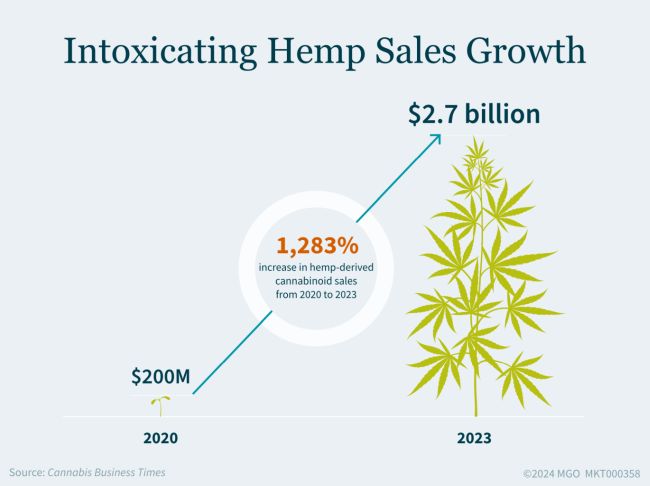Mondaq

Macias Gini & O’Connell
Intoxicating hemp products have had explosive growth but are now facing regulatory and other headwinds, with states like California, Missouri, and New Jersey… Key Takeaways:- The intoxicating hemp industry offers exciting opportunities for innovation and revenue growth, but navigating its complex and changing regulatory landscape requires adaptability and strategic planning.
- While consumer demand for intoxicating hemp products is surging, businesses face challenges like a changing regulatory environment, banking hurdles, and the need for extensive consumer education.
- Success in this evolving market demands a comprehensive strategy addressing compliance, financial management, and risk mitigation to capitalize on opportunities while navigating regulatory changes.
- Whether you agree with how these products came to market, many now believe that they will survive the regulatory process in some form, most likely in an environment with state-by-state regulations.
The Rise of Intoxicating Hemp
Intoxicating hemp products are the result of wording in the 2018 Farm Bill, which created a gray area where alternative cannabinoids — such as Delta-8 THC, Delta-10 THC, HHC, and a host of other compounds — have come into existence. Since then, due to the ability to access traditional retail channels (including direct-to-consumer) and a lower tax and regulatory burden compared to cannabis, the market for intoxicating hemp products has exploded. These products, which offer consumers a legal alternative to traditional cannabis, have gained popularity in the form of beverage, tinctures, vapes, and other consumables. While this boom presents exciting opportunities, it also introduces a host of challenges for those entering or already operating in the intoxicating hemp industry.Opportunities in the Intoxicating Hemp Market
The intoxicating hemp industry offers several key opportunities for companies looking to expand or diversify their product lines: 1. Rising Consumer Demand The demand for intoxicating hemp products has skyrocketed. Products such as Delta-8 THC and Delta-9 THC are increasingly popular due to their similar effects to cannabis while staying within a legal gray area and being more widely available. Gummies and beverages, in particular, have emerged as popular product forms — with beverages providing an appealing alternative as younger generations report decreased alcohol consumption. This creates a growing market for your business to tap into. Curaleaf, Kiva, Medterra, Wyld, 1906, and Tilray — which just recently launched a lineup of hemp-derived Delta-9 THC mocktails, seltzers, and sparkling drinks in the U.S. — are among the cannabis companies that have already entered the hemp market. In a recent Cannabis Business Times survey, 17% of participants from state-legal cannabis businesses said they are currently growing or selling intoxicating hemp-derived cannabinoid products and 26% said they are considering or would consider growing or selling intoxicating hemp products. 2. New Revenue Streams For cannabis operators and hemp sellers, the intoxicating hemp market offers a way to diversify revenue streams. If you are already in the cannabis business, adding hemp-derived products can provide a complementary line that broadens your market reach. While regulations continue to evolve, potential remains to sell in more mainstream retail spaces — further increasing revenue opportunities. 3. National Scaling and Partnerships One of the key advantages of intoxicating hemp is the ability to scale your brand nationally through interstate commerce. Unlike cannabis, which faces strict state-by-state regulations, intoxicating hemp can be legally shipped across state lines. Additionally, forming strategic partnerships with other brands, such as those in the food and beverage industry, can further enhance your product offerings and brand visibility.


